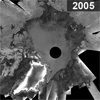 Federated Farmers president Charlie Pedersen (our second Pedersen of the day — see ice post below) uses the opportunity of an opinion column in the Herald today to run his NZ farmers are “global warming heroes” PR once more round the block.
Federated Farmers president Charlie Pedersen (our second Pedersen of the day — see ice post below) uses the opportunity of an opinion column in the Herald today to run his NZ farmers are “global warming heroes” PR once more round the block.
Surely it would be better for the global environment if these inefficient food producers scaled back their food production, and instead bought more food from New Zealand. It seems obvious that increasing greenhouse gas emissions in New Zealand to produce more food is, overall, a better way to curb climate change. The whole world would be better off. So the next time you hear someone having a go at New Zealand farmers stuffing up the climate, challenge it. Remember, compared with subsidised, inefficient farmers in most other countries, New Zealand farmers are climate change heroes.
Charlie gets the basics of his argument right: food miles are a blunt tool, NZ farmers are — in world terms — relatively low-carbon producers of food, but his main point is both subtle and debatable. Buying NZ farm produce instead of more local, but higher carbon food would result in a net reduction in global emissions — if it were likely to happen. It isn’t. The “local food” movement (evidenced by the huge growth in farmer’s markets around the world) is about more than just carbon emissions. Consumers buy local because they like to support their local producers, and celebrate fresh seasonal produce. It’s a food and lifestyle movement, not a green ideology. It’s not going away, and whether our farmers like it or not, NZ is not local to anywhere other than itself.
The “subsidised, inefficient farmers” Charlie’s busily bagging will respond by reducing their carbon footprints, and improving their international carbon competitiveness. Our farmers need to be proactive, and do the same if they want to maintain their sales in export markets. It’s a commercial necessity. Sitting on your carbon laurels is not good policy.

